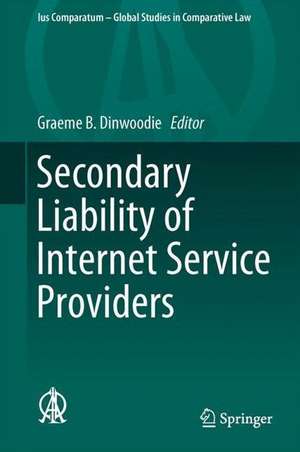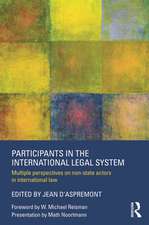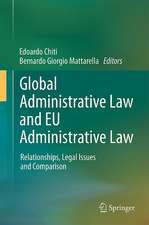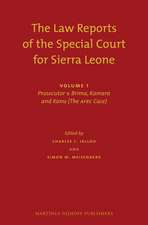Secondary Liability of Internet Service Providers: Ius Comparatum - Global Studies in Comparative Law, cartea 25
Editat de Graeme B. Dinwoodieen Limba Engleză Hardback – 7 iul 2017
| Toate formatele și edițiile | Preț | Express |
|---|---|---|
| Paperback (1) | 1004.00 lei 6-8 săpt. | |
| Springer International Publishing – 12 aug 2018 | 1004.00 lei 6-8 săpt. | |
| Hardback (1) | 1010.03 lei 6-8 săpt. | |
| Springer International Publishing – 7 iul 2017 | 1010.03 lei 6-8 săpt. |
Din seria Ius Comparatum - Global Studies in Comparative Law
- 18%
 Preț: 1584.40 lei
Preț: 1584.40 lei - 18%
 Preț: 1009.22 lei
Preț: 1009.22 lei - 18%
 Preț: 1573.51 lei
Preț: 1573.51 lei - 18%
 Preț: 1255.16 lei
Preț: 1255.16 lei - 24%
 Preț: 1515.12 lei
Preț: 1515.12 lei - 24%
 Preț: 802.76 lei
Preț: 802.76 lei - 15%
 Preț: 651.84 lei
Preț: 651.84 lei - 18%
 Preț: 958.56 lei
Preț: 958.56 lei - 24%
 Preț: 812.88 lei
Preț: 812.88 lei - 15%
 Preț: 653.33 lei
Preț: 653.33 lei - 15%
 Preț: 654.43 lei
Preț: 654.43 lei - 18%
 Preț: 1401.16 lei
Preț: 1401.16 lei - 18%
 Preț: 1007.80 lei
Preț: 1007.80 lei - 18%
 Preț: 898.89 lei
Preț: 898.89 lei - 18%
 Preț: 956.99 lei
Preț: 956.99 lei - 18%
 Preț: 789.98 lei
Preț: 789.98 lei - 15%
 Preț: 644.95 lei
Preț: 644.95 lei - 18%
 Preț: 953.97 lei
Preț: 953.97 lei - 18%
 Preț: 1009.85 lei
Preț: 1009.85 lei - 18%
 Preț: 955.08 lei
Preț: 955.08 lei - 18%
 Preț: 2787.02 lei
Preț: 2787.02 lei - 18%
 Preț: 1403.67 lei
Preț: 1403.67 lei - 18%
 Preț: 2114.90 lei
Preț: 2114.90 lei - 18%
 Preț: 2107.49 lei
Preț: 2107.49 lei - 18%
 Preț: 997.71 lei
Preț: 997.71 lei - 18%
 Preț: 955.40 lei
Preț: 955.40 lei
Preț: 1010.03 lei
Preț vechi: 1231.73 lei
-18% Nou
Puncte Express: 1515
Preț estimativ în valută:
193.30€ • 201.06$ • 159.57£
193.30€ • 201.06$ • 159.57£
Carte tipărită la comandă
Livrare economică 15-29 aprilie
Preluare comenzi: 021 569.72.76
Specificații
ISBN-13: 9783319550282
ISBN-10: 3319550284
Pagini: 384
Ilustrații: XII, 386 p. 2 illus.
Dimensiuni: 155 x 235 mm
Greutate: 0.74 kg
Ediția:1st ed. 2017
Editura: Springer International Publishing
Colecția Springer
Seria Ius Comparatum - Global Studies in Comparative Law
Locul publicării:Cham, Switzerland
ISBN-10: 3319550284
Pagini: 384
Ilustrații: XII, 386 p. 2 illus.
Dimensiuni: 155 x 235 mm
Greutate: 0.74 kg
Ediția:1st ed. 2017
Editura: Springer International Publishing
Colecția Springer
Seria Ius Comparatum - Global Studies in Comparative Law
Locul publicării:Cham, Switzerland
Cuprins
I. Introduction; A Comparative Overview of the Secondary Liability of Internet Service Providers; Graeme B. Dinwoodie.- II. Sources and Concepts.- The Different bases for Secondary Liability of Service Providers in Poland; Xawery Konarski and Tomasz Targosz.- Secondary Liability of Internet Service Providers in The United States: General Principles and Fragmentation; Salil K. Mehra and Marketa Trimble.- ISP Secondary Liability: A Portuguese Perspective on Omissions as the Basis for Secondary Liability; João Fachana.- The Legal Framework Governing Online Service Providers in Cyprus; Tatiana Synodinou and Philippe Jougleux.- Analysis of ISP regulation under Italian Law; Vincenzo Franceschelli, Oreste Pollicino and Elisa Bertolini.- Secondary Liability of Service Providers in Brazil: the Effect of the Civil Rights Framework; Caitlin Mulholland.- Intermediary Liability for IP Infringement in Finland: Copyright vs. Copyleft—A Series of Legislative Proposals and Decade of Debates; Katja Weckstrom.- Common Law Pragmatism: New Zealand’s Approach to Secondary Liability of Internet Service Providers; Graeme Austin.- III. Policy Mechanisms.- Ivana Kunda and Jasmina Mutabzija, Secondary Liability of Internet Intermediaries and Safe Harbours under Croatian law.- Radim Polčák, Information Society Between Orwell and Zapata: A Czech Perspective on Safe Harbours.- Jaani Riordan, Website Blocking Injunctions under United Kingdom and European Law.- The Liability of Internet Intermediaries and Disclosure Obligations in Greece; Georgios N. Yannopoulos.- IV.Specific Contexts.- Internet Service Provider Copyright Infringement in Taiwan; Lung-Sheng Chen.- Secondary Liability for Open Wireless Networks in Germany: Balancing Regulation and Innovation in the Digital Economy; Christoph Busch.
Recenzii
“This book offers a very comprehensive analysis of doctrinal structure and court decisions across several nations that, once read in a collective way, contribute to the identification of common aspects and transnational behaviors that emerge in the absence of hard international law.”(Alessandro Berni, Computing Reviews, June, 2018)
Notă biografică
Graeme B. Dinwoodie is the Professor of Intellectual Property and Information Technology Law at the University of Oxford, Director of the Oxford Intellectual Property Research Centre, and a University Professor at Chicago-Kent College of Law. He has previously taught at the National University of Singapore (as the Yong Shook Lin Professor in Intellectual Property Law), New York University University School of Law (as a Global Visiting Professor of Law), the University of Pennsylvania School of Law, and the University of Cincinnati College of Law. Immediately prior to taking up the IP Chair at Oxford, Professor Dinwoodie was for several years a Professor of Law at Chicago-Kent College of Law and, from 2005-2009, also held a Chair in Intellectual Property Law at Queen Mary College, University of London. Professor Dinwoodie holds law degrees from the University of Glasgow, Harvard Law School (where he was a John F. Kennedy Scholar), and Columbia Law School (where he was aBurton Fellow). He is an elected member of the American Law Institute, and served as President of the International Association for the Advancement of Teaching and Research in Intellectual Property from 2011-2013. In 2008, the International Trademark Association awarded Professor Dinwoodie the Pattishall Medal for Teaching Excellence in Trademark Law. He is the author of numerous articles and books on trade mark law and on international and comparative intellectual property law.
Textul de pe ultima copertă
This book analyses the doctrinal structure and content of secondary liability rules that hold internet service providers liable for the conduct of others, including the safe harbours (or immunities) of which they may take advantage, and the range of remedies that can be secured against such providers. Many such claims involve intellectual property infringement, but the treatment extends beyond that field of law. Because there are few formal international standards which govern the question of secondary liability, comprehension of the international landscape requires treatment of a broad range of national approaches. This book thus canvasses numerous jurisdictions across several continents, but presents these comparative studies thematically to highlight evolving commonalities and trans-border commercial practices that exist despite the lack of hard international law. The analysis presented in this book allows exploration not only of contemporary debates about the appropriate policy levers through which to regulate intermediaries, but also about the conceptual character of secondary liability rules.
Caracteristici
Reveals wide variation among countries regarding the character of secondary liability rules Analyses the doctrinal structure and content of secondary liability rules that hold internet service providers liable for the conduct of others Highlights evolving commonalities and transborder commercial practices that exist despite the lack of hard international law Discusses sources and concepts, policy mechanisms, and specific contexts













